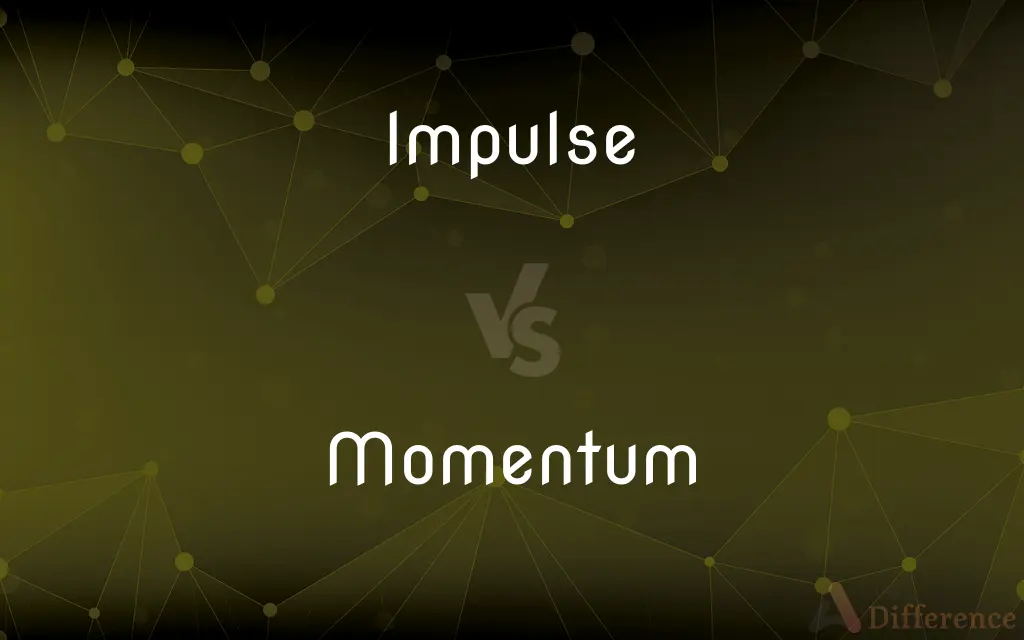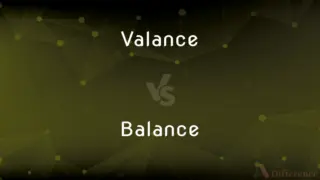Impulse vs. Momentum — What's the Difference?
Edited by Tayyaba Rehman — By Urooj Arif — Updated on March 8, 2024
Impulse changes momentum, while Momentum is motion's quantity.

Difference Between Impulse and Momentum
Table of Contents
ADVERTISEMENT
Key Differences
Impulse is a vector quantity that represents the change in momentum of an object when it is subjected to a force over a period of time. It is calculated as the product of force and time. Whereas momentum is also a vector quantity, representing the quantity of motion an object has, calculated as the product of an object's mass and velocity.
Momentum is a measure of how difficult it is to stop a moving object and depends on the object's mass and velocity. On the other hand, impulse involves the application of a force over a time interval and is the mechanism through which an object's momentum can be changed, either by increasing or decreasing its velocity.
The concept of impulse is crucial in understanding how forces affect motion over time. For instance, the same impulse can result from a large force applied briefly or a small force applied over a longer time. Conversely, momentum provides a snapshot of an object's motion at a given instant, independent of how it got to that state.
In a collision or interaction, the change in momentum of an object is equal to the impulse applied to it. This principle underpins the law of conservation of momentum in closed systems, where the total momentum before and after an interaction remains constant. Meanwhile, the impulse given to each object involved in the interaction is what causes this change in momentum, highlighting their interdependence.
Impulse is often discussed in scenarios involving sudden forces, such as in sports or vehicle crashes, where it is crucial to understand the effects of force over time. Whereas momentum is a fundamental concept in both classical and quantum mechanics, providing a comprehensive description of the motion of objects ranging from everyday objects to subatomic particles.
ADVERTISEMENT
Comparison Chart
Definition
Change in momentum due to a force over time
Quantity of motion, product of mass and velocity
Formula
Impulse = Force × Time
Momentum = Mass × Velocity
Units
Newton-second (Ns) or kg·m/s
Kilogram-meter per second (kg·m/s)
Role in Physics
Describes how force application changes momentum
Describes motion's quantity
Conservation Principle
Not conserved, but transfers between objects
Conserved in closed systems without external forces
Compare with Definitions
Impulse
Impulse measures the effect of a force applied over a time period.
The goalkeeper experiences an impulse when stopping a fast-moving soccer ball.
Momentum
Momentum represents the quantity of motion an object possesses.
A moving train has a large momentum due to its high mass and velocity.
Impulse
It quantifies the change in an object's momentum.
A boxer's punch delivers an impulse changing the momentum of the punching bag.
Momentum
Both factors directly influence an object's momentum.
A faster or heavier object has more momentum.
Impulse
Crucial for understanding impacts and collisions.
In car crash tests, the impulse is measured to improve safety features.
Momentum
Momentum is conserved in closed systems, a fundamental principle in physics.
In a pool game, the total momentum before and after a collision remains constant.
Impulse
Impulse is key in optimizing performance and safety in sports.
Golfers adjust their swing to maximize the impulse transferred to the ball.
Momentum
Applies to a wide range of scales, from subatomic particles to celestial bodies.
Scientists study the momentum of particles in accelerators to understand fundamental forces.
Impulse
Can result from a high force in a short time or a lower force over a longer time.
Catching an egg requires applying a small force over a longer time to reduce the impulse and avoid breaking it.
Momentum
Provides a momentary picture of an object's motion.
The momentum of a satellite is calculated to understand its trajectory around Earth.
Impulse
An impelling force; an impetus.
Momentum
In Newtonian mechanics, linear momentum, translational momentum, or simply momentum (pl. momenta) is the product of the mass and velocity of an object.
Impulse
The motion produced by such a force.
Momentum
Symbol p(Physics) A quantity used to measure the motion of a body, equal to the product of the body's mass and its velocity. Also called linear momentum.
Impulse
A sudden wish or urge that prompts an unpremeditated act or feeling; an abrupt inclination
Had an impulse to run away.
An impulse of regret that made me hesitate.
Bought a hat on impulse.
Momentum
The force or energy exhibited by a moving body
The ball did not have enough momentum to reach the goalposts.
Impulse
A motivating force or tendency
"Respect for the liberty of others is not a natural impulse in most men" (Bertrand Russell).
Momentum
The driving force or advancing strength of a development or course of events
The effort to reform public education has been gaining momentum.
Impulse
(Electronics) A surge of electrical power in one direction.
Momentum
(Philosophy) An essential or constituent element; a moment.
Impulse
(Physics) The product obtained by multiplying the average value of a force by the time during which it acts. The impulse equals the change in momentum produced by the force in this time interval.
Momentum
(physics) Of a body in motion: the tendency of a body to maintain its inertial motion; the product of its mass and velocity, or the vector sum of the products of its masses and velocities.
Impulse
(Physiology) The electrochemical transmission of a signal along a nerve fiber that produces an excitatory or inhibitory response at a target tissue, such as a muscle or another nerve.
Momentum
The impetus, either of a body in motion, or of an idea or course of events; a moment.
Impulse
Characterized by impulsiveness or acting on impulse
An impulse shopper.
Impulse buying.
Momentum
The quantity of motion in a moving body, being always proportioned to the quantity of matter multiplied by the velocity; impetus.
Impulse
A thrust; a push; a sudden force that impels.
Momentum
Essential element, or constituent element.
I shall state the several momenta of the distinction in separate propositions.
Impulse
A wish or urge, particularly a sudden one prompting action.
The impulse to learn drove me to study night and day.
When I saw the new book, I couldn't resist the impulse to browse through it.
Momentum
A property of an activity or course of events, viewed as analogous to forward motion or to physical momentum (def. 1), such that the activity is believed to be able to continue moving forward without further application of force or effort; - often used to describe an increase in the acquisition of public support for a purpose; as, as, the petition drive gained momentum when it was mentioned in the newspapers.
Impulse
(physics) The integral of force over time.
The total impulse from the impact will depend on the kinetic energy of the projectile.
Momentum
An impelling force or strength;
The car's momentum carried it off the road
Impulse
(transitive) To impel; to incite.
Momentum
The product of a body's mass and its velocity;
The momentum of the particles was deduced from meteoritic velocities
Impulse
The act of impelling, or driving onward with sudden force; impulsion; especially, force so communicated as to produced motion suddenly, or immediately.
All spontaneous animal motion is performed by mechanical impulse.
Impulse
The effect of an impelling force; motion produced by a sudden or momentary force.
Impulse
The action of a force during a very small interval of time; the effect of such action; as, the impulse of a sudden blow upon a hard elastic body.
Impulse
A mental force which simply and directly urges to action; hasty inclination; sudden motive; momentary or transient influence of appetite or passion; propension; incitement; as, a man of good impulses; passion often gives a violent impulse to the will; to buy something on impulse.
These were my natural impulses for the undertaking.
Impulse
To impel; to incite.
Impulse
An instinctive motive;
Profound religious impulses
Impulse
A sudden desire;
He bought it on an impulse
Impulse
The electrical discharge that travels along a nerve fiber;
They demonstrated the transmission of impulses from the cortex to the hypothalamus
Impulse
(electronics) a sharp transient wave in the normal electrical state (or a series of such transients);
The pulsations seemed to be coming from a star
Impulse
The act of applying force suddenly;
The impulse knocked him over
Impulse
An impelling force or strength;
The car's momentum carried it off the road
Common Curiosities
Can impulse be negative?
Yes, if the force applied opposes the direction of motion, resulting in a decrease in momentum.
What is impulse in physics?
Impulse is the product of force and the time over which it is applied, resulting in a change in an object's momentum.
Is momentum always conserved?
In closed systems without external forces, momentum is conserved, but it can change within the system due to internal forces.
How is momentum defined?
Momentum is defined as the product of an object's mass and velocity, representing its quantity of motion.
Why is understanding impulse important in sports?
It helps in optimizing performance and safety, by understanding how forces applied over time affect motion.
How does impulse relate to momentum?
Impulse is the mechanism by which an object's momentum is changed, equal to the change in momentum.
How can the same impulse be achieved with different forces?
By varying the duration over which the force is applied; a larger force over a shorter time can have the same impulse as a smaller force over a longer time.
What is the significance of the velocity in determining momentum?
Velocity determines the direction and magnitude of momentum; higher velocity means more momentum.
What role does mass play in momentum?
Mass directly influences momentum; more mass means more momentum if velocity is constant.
What is an example of impulse in everyday life?
Applying brakes in a car to stop involves an impulse that changes the vehicle's momentum.
How does the conservation of momentum apply in collisions?
The total momentum of all objects involved before the collision equals the total momentum after, assuming no external forces.
Can momentum be transferred from one object to another?
Yes, in collisions or interactions, momentum can be transferred between objects.
What illustrates the principle of momentum conservation?
Elastic collisions, where no kinetic energy is lost, vividly illustrate momentum conservation, as the total momentum remains constant.
How is impulse measured?
Impulse is measured as the product of force and time, typically in Newton-seconds (Ns) or kg·m/s.
Why is impulse significant in collision analysis?
It helps in understanding the forces involved and the resulting changes in momentum, crucial for safety and design in various fields.
Share Your Discovery

Previous Comparison
Teleological vs. Deontological
Next Comparison
Valance vs. BalanceAuthor Spotlight
Written by
Urooj ArifUrooj is a skilled content writer at Ask Difference, known for her exceptional ability to simplify complex topics into engaging and informative content. With a passion for research and a flair for clear, concise writing, she consistently delivers articles that resonate with our diverse audience.
Edited by
Tayyaba RehmanTayyaba Rehman is a distinguished writer, currently serving as a primary contributor to askdifference.com. As a researcher in semantics and etymology, Tayyaba's passion for the complexity of languages and their distinctions has found a perfect home on the platform. Tayyaba delves into the intricacies of language, distinguishing between commonly confused words and phrases, thereby providing clarity for readers worldwide.
















































